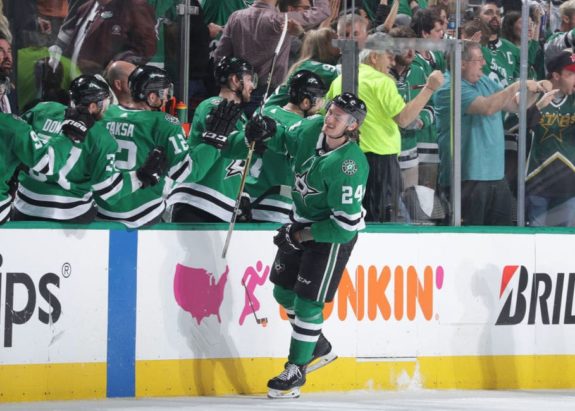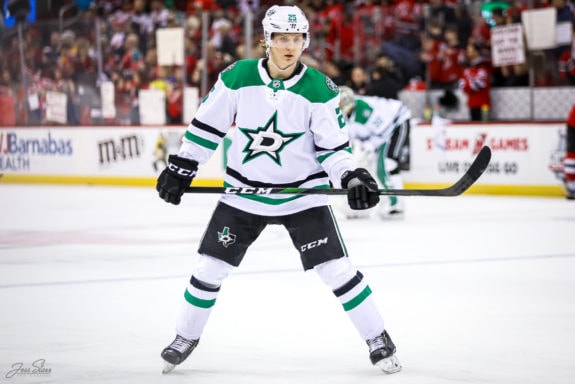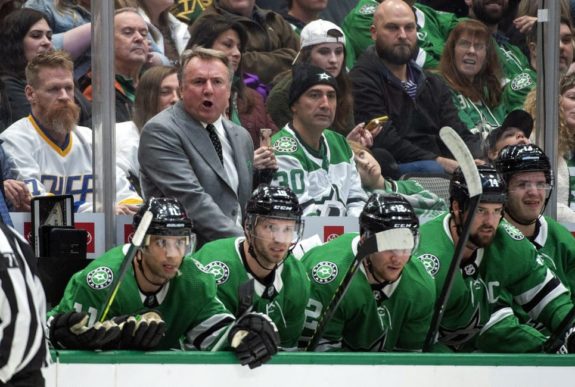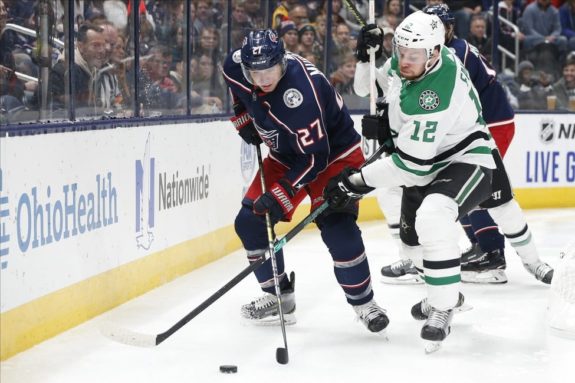When the 2021 Stanley Cup Playoffs begin this week, the Dallas Stars will not take part. They missed out on the playoffs as they watched the Nashville Predators clinch the fourth and final spot in the Central Division. The team joined the ranks of the few teams to miss the playoffs after playing in the Stanley Cup Final the previous season. There is a lot to digest from this season which we will dig into throughout this summer. To start, these are what I believe to be the five main reasons that the Stars missed the 2021 playoffs.
Injuries
This is usually one of the main culprits that stop a team from reaching its full potential. We saw it with Dallas in the playoffs last season, and it reared its ugly head even more in 2021. The injury bug hit before the season began when the team announced that both Tyler Seguin and Ben Bishop would miss significant time recovering from surgeries. Both players were hoping to return by April if everything went according to plan. Due to schedule changes, lack of practice time, and complications in their recoveries, Seguin did not return until May, while Bishop was ruled out for the entire season.
Aside from that, plenty of injuries popped up as the season began. Roope Hintz was injured in the Stanley Cup Final and believed he had rested the injury enough to return to training camp in full health. After a few days of camp, he became aware that his groin (disclosed after the season) was worse than believed and found that he would most likely need surgery to repair it. Rather than get the surgery and miss most of the season, he decided to play through the pain.

“It’s an amazing story and shows the commitment from our players. … In a normal season, he probably wouldn’t be playing,” head coach Rick Bowness said. “We would have been able to get it fixed but we haven’t because of the shortened season.
Hintz was a game-time decision in every game this season, playing in 41 of the teams’ 56. He was the Stars’ best forward every time he suited up and was greatly missed when he could not go. With the success he had dealing with this injury, it is hard not to think about what could have been if he was fully healthy.
Alexander Radulov started the season in his best form, with 11 points in the first eight games. He then missed the next month due to injury. When he returned, he made an immediate impact scoring the shootout winner against the Columbus Blue Jackets and adding a goal the following night. After only his third game back, he was back on the injured list and would not play another game all season. It was announced at the trade deadline that he would miss the remainder of the season to repair a core injury. Radulov has been one of the top offensive threats since coming to Dallas, and his constant energy is infectious.
Speaking of energy, Joel Kiviranta, fresh off his heroic run in the bubble last season, was an exciting story in Dallas. His potential was endless, and the team and league were anxious to see how he would perform.

After registering two points in the first game of the season, he missed a few games due to injury. After that, he was in and out of the lineup and never looked to be the same player. To make things worse, he sustained a more serious injury in a loss to the Nashville Predators at the end of March, causing him to miss nearly one month. He made an immediate impact in his return, scoring three goals in the teams’ final seven games but played in only 26 games all season.
“I would ‘ve loved to have seen Bish in the net, had a healthy Rads and healthy Seggy and rolled lines like you normally do,” Bowness said. “We know on paper with a healthy team, we’re fighting with those other teams for first place in the division, there’s no question in my mind.”
There were many more injuries and illnesses throughout the year as nearly every player and even head coach Rick Bowness missed some time.
One-Goal Games
The first stat that stands out when looking at the 2021 Stars is their strange record. The team ended the season 23-19-14. The 14 losses past regulation were a huge topic all season as they missed chances to secure two points in far too many contests. Of the 14 overtime/shootout losses, five of them came against Nashville. Nashville went 10-2 past regulation which played a huge part in them clinching a playoff spot over Dallas.
The Stars seemingly found a new way to lose each night as they headed to overtime. Whether it was a glaring mistake, a big save from the opposing netminder, or a missed assignment, they never could figure out a way to consistently pick up the extra point finishing 9-6-14 in one-goal games this season.
“You compete in a lot of one-goal games, and that says a lot about the league, how close it is and how sharp you have to be,” Joe Pavelski said. “At the end of the day, the overtimes hurt us. We didn’t get enough points. As a player, you look at things and you try to figure things out, and that’s an area where we left a lot on the table.”
Scoring Issues
Scoring has been a weak spot for this defensive-minded Stars team for a few years. They struggled to score last season and were predicted to face the same struggles going into this season without the help of Seguin. While they do not need to score five goals per night to win, they were unable to find enough offense to do it consistently.
Dallas ended the season 16th in scoring with 156 goals in 56 games (2.79 per game). This proved costly in many games that they played more than well enough to win but were unable to find the extra goal. Early on in the season, Rick Bowness sounded like a broken record when speaking about what went wrong in the losses, as it usually sounded something like this:
“Well, we are trying. If it doesn’t go in it doesn’t go in,” Bowness said of the battle to score goals. “They had two even-strength shots on net after 40 minutes and they were up 4-0. We had some grade-A’s that didn’t go in. We had a breakaway that didn’t score, and they scored on their’s.”

The scoring issues were especially true in the first period. Dallas was near the bottom of the league with only 39 first-period goals all season (just 15 on the road). These slow starts put them in the position of one-goal games, and we all saw how that turned out for them. This was even more important since the Stars went 6-15-9 when giving up the first goal of the game.
Schedule
The 2021 schedule began with immediate adversity for the Stars. They were the first team hit with a COVID-19 issue and were forced to postpone their first four games. That was soon followed by a massive winter storm in February, which caused them to postpone four more games, leaving eight games to be added to their schedule throughout an already-condensed season. Since Dallas was the first to have these issues, the NHL rescheduled their games as fast as possible hoping, that there would be minimal changes across the league the rest of the season.
Latest Stars Content:
- 9 NHL Teams That Missed in Free Agency
- Top Contenders for 2025 Calder Trophy
- NHL Rumors: Hurricanes, Maple Leafs, Stars, Sharks
As nearly every NHL team ran into the same postponements throughout, Dallas was forced to play their 56 games over the span of only 108 days, the shortest in the NHL. This caused the Stars to play four games in six nights nearly every week. They experienced their final two-day break in February and played what felt like every night after that. For a team already dealing with injuries, this condensed schedule meant they would suffer even more of them as they tried to find energy every night.
To go along with the condensed schedule, COVID also forced the NHL to realign the divisions for this season. Instead of the normal Central Division, Dallas was forced to play with Eastern Conference teams such as the Florida Panthers, Carolina Hurricanes, and their Stanley Cup foes, the Tampa Bay Lightning. It just so happens that those three will most likely finish the season in the top five of the entire league.
Florida and Carolina have put together their best season in years, while Tampa Bay has continued to roll after their Stanley Cup win in 2020. Dallas went 6-12-6 against the top tier of the division and was forced to battle Nashville for the fourth spot.
Penalty Kill
The Stars are consistently one of the best defensive teams in the league. Their penalty kill is not always elite but usually does enough to win games. This season, that was simply not the case. They currently rank 19th in the NHL at 79%, and at times, it seemed even worse.

It is often talked about within a hockey game that a team needs “that goal” or “that save” at a key moment. The same can be said for special teams. Some penalty kills or power plays feel more vital than others and can be the difference in the game whether statistically or emotionally.
This season, the Stars were unable to come up with “that kill” on a consistent basis. In the final weeks of the season, it seemed that whenever they needed a big kill, they conceded a power-play goal. Even worse, when they would finally kill a big penalty, they constantly put themselves right back in the box soon after. In a season where they held the fifth-best power play in the league, their penalty kill did not need to be outstanding. Unfortunately, it needed to be better than it was, and it cost them in the end.
While the Stars are disappointed in the way the season ended, they know that they dealt with a lot in 2021 and are looking forward to the next season.
“You have no idea what this team has been through for the last 11 weeks,” Rick Bowness said. “I know we missed the playoffs and that’s so devastating and disappointing, because of the effort and the sacrifices these players have made for such a long time. But again, even this game tonight, it never should’ve gone to overtime, but they battled right to the end with a big penalty kill. This team has a lot of heart and a lot of character and a lot of chemistry, and there’s better days ahead for us, for sure.”